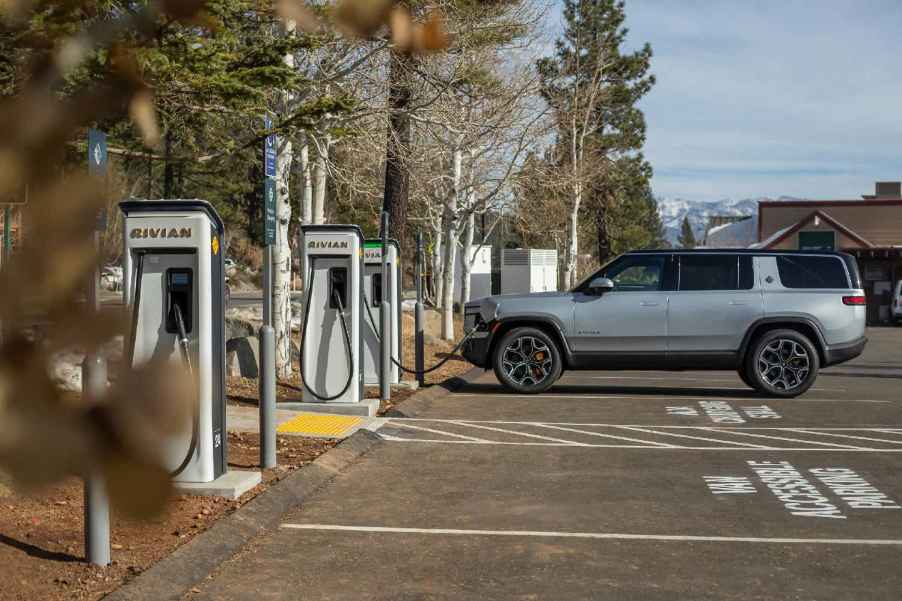
Can Rivian, Lucid, and Fisker Survive?
As the automotive industry embraces EV technology, several startup companies are trying to excel in the electric vehicle market. But, despite their best efforts, they seem to be struggling, leaving many analysts wondering if they will survive.
Younger EV makers such as Rivian, Fisker, and Lucid seemed promising several years ago, with their valuations spiking after going public. However, as their shares spiral in a downward trend, only time will tell if they will be able to hold on as their cash supplies rapidly dwindle.
What the future looks like for EV automakers
Last year, Rivian produced 24,337 vehicles, just shy of its projected 25,000 goal. The Irvine-based EV startup reported $663 million in revenue for Q4 of 2022, but it was not enough to counteract its $1.72 billion net loss.
Rivian plans to manufacture 53,000 vehicles in 2023, doubling last year’s production. According to dot.LA, “With $12.1 billion left in its coffers, the EV hopeful still has some wiggle room, but at the current burn rate, the company will likely be out of cash before the end of 2025.”
The Washington Post reported Fisker, Rivian, and Lucid experienced rapid growth when they first appeared on the EV scene, but their company valuations have recently deflated by as much as 75%. It is rare for startups to see a profit in the first few years of business, but considering it took Tesla almost two decades before the EV pioneer reported its first full-year profit, these companies have a long road ahead of them.
Elon Musk believes Rivian and Lucid are heading toward bankruptcy
Some industry analysts suggest smaller EV companies will struggle to stay competitive, similar to the beginning days of automaking in the early 20th century. Michelle Krebs, an executive analyst at Cox Automotive, told the Washington Post, “There was a shakeout of just a few players that just happened to be in Michigan,” referring to Chrysler, General Motors, and Ford. She said the number of companies trying to enter the EV market is “déjà vu,” saying, “There will be a shakeout.”
Higher interest rates, decreased funding opportunities, and competition from legacy automakers make it difficult for new EV makers to stay in the game. For example, Ford reported a $3 billion loss at the beginning of the year but will still experience an overall profit of $11 billion.
Unlike Ford, companies such as Rivian, Lucid, and Fisker do not have gas-powered vehicle revenues to subsidize the EV business losses. Krebs claims, “There surely will be failures because so many have started up and times have drastically changed.”
Electrek reported that Elon Musk said last year in an interview with the Tesla Silicon Valley Owner Club, “Unless something changes significantly with Rivian and Lucid, they will both go bankrupt.”
The Tesla founder said, “I hope they can do something, but unless they can cut their cost dramatically, they are in deep trouble and will end up in the car cemetery like every other with the exception of Ford and Tesla.”
New EV makers reporting substantial revenue losses for the first three months of 2023
During this time of uncertainty and risk in the EV market, Lucid recently reported a $779 million loss for the first three months of 2023, considerably higher than the $81 million loss the fledgling company reported for the same quarter in 2022.
With coffers that once contained $1.7 billion at the end of last year, funds now sit depleted at $900 million and are going fast to account for rising costs, broken supply chains, and staggering software expenses.
Fisker also recently reported a revenue loss of $120 million for the first three months of 2023, churning through approximately $84 million in cash. The EV startup reduced its forecasted production target of 42,400 to somewhere between 32,000 and 36,000 units.
Likewise, Rivian also reported a substantial loss of $1.3 billion for the first three months of 2023. On the contrary, Tesla reported a profit of $2.5 billion for the first three months of the year, albeit about 24% lower than the same period of 2022.
As major players such as GM, Tesla, and Ford continue to forge full steam ahead with their EV product lines, younger EV automakers are feeling the squeeze and finding it hard to remain competitive.


